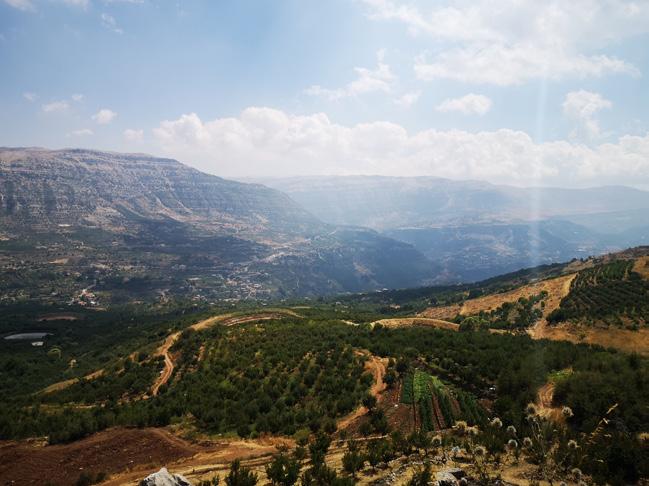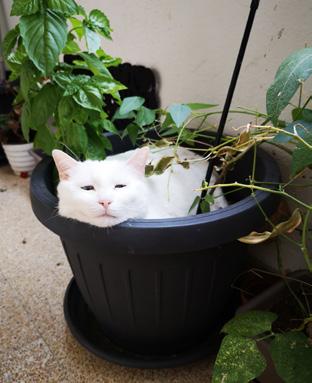
9 minute read
Dirt!
By Nikolett Puskas
Nikolett Puskas is a PhD candidate at the Institute for Global Prosperity, University College London, and holds an MSc in leadership for global sustainable cities, an MA in sustainable design, and a BSc in light industrial engineering.
We are living in a moment where a globally shared collective memory is being created by COVID-19, but it is important to emphasize the even larger on-going crisis: the climate emergency.
These two major challenges have an immediate impact on our daily lives. However, the situation is further exacerbated in some corners of the world. One such place is Lebanon, which is facing extraordinarily tough times. In addition to these two challenges, there is an ongoing economic crisis, topped off by the Beirut blast of 2,750 tons of ammonium nitrate on 4th August 2020. The port and the grain silos were destroyed, resulting in the loss of approximately 15,000 tonnes of grain. In this gloomy context, we can still find seeds of hope and inspiration in Lebanon.

Lebanese rural landscape
© Nikolett Puskas
Extreme events highlight our vulnerabilities. These events also demonstrate a people’s resilience and adaptive capacities. Since the IPCC report in 2007, increasing attention is paid to the importance of having adaptation measures and strategies in place that can address future uncertainties and vulnerabilities. This approach is primarily shared by scientists and academics, together with a growing number of leaders and public bodies who recognise the crucial importance of this topic, as more cities are affected by extreme natural events, a consequence of changing climate. Beirut had no such plans or any mitigation strategies in place when it was hit by an unnatural event. It did however have its people and a unique social fabric. Without waiting even for one moment, people came together, self-organised, to clean up the wreckage and provided help for those seriously affected by the explosion in any way required. This article focuses on aspects of food security and urban agriculture by looking at two local initiatives.
I spoke with Souad Abdallah, who initiated ‘Kon’, a social solidarity movement focusing on agriculture. It started on Souad’s rooftop in the Furn el Chebbak neighbourhood of Beirut, as a genuine grassroots initiative with a handful of neighbours coming together. One of the triggers for this was the home quarantine. We all wanted to ‘breathe’ and have a sense of space beyond the four walls of our homes. Being locked down in a concrete jungle made us all the more thirsty for ‘green’. In this context, the idea of gardening was not only caring for and nurturing plant life, but also a way of caring for ourselves and our mental health. Gardening and farming also offer an opportunity to deconstruct the gendered notion of ‘care’, historically assigned to women in western societies (1). It is also an elegant way of ‘taking our future into our own hands’.
Souad had no previous training, relevant professional knowledge or skills in this field, but she managed to create a beautiful network with experts who were willing to share their knowledge and provide workshops (both offline and online) for the community – the non-expert part of that network. The topics included vermicomposting (2), the solitary wasp (3) and seed extraction (4). There was a lot of experiential learning as well, as they tried different methods of cultivation and encountered particular problems unique to Beirut’s microclimate. They employed the lasagna gardening technique (5), for which the green waste was collected in the neighbourhood.
The other trigger was the Lebanese revolution, that initially made Souad think deeply about the urgent need to transform the approach to aid assistance. Lebanon is a country which has been dependent on foreign aid for a long time. This is clearly an unsustainable approach, and it has also made many of its people forget about their own cultural heritage, resources and indigenous sustainable practices. The global pandemic and the blast has made this all the more relevant and pressing, urging us to go back to our roots and revive these practices. After extensive research, Kon adopted permaculture (6), based on the core values of fair share and equal respect for people and nature. The initiative even received a donation in the form of land use outside Beirut, where the volunteers planted and harvested wheat by hand and returned the produce to the local community. Next year the plan is to cultivate 5,000 square metres of land. The initiative employs circular economy (7) and barter principles8. Urban agriculture is a demanding endeavour, an intense interaction with living things, where one has to quickly respond to needs and keep the plants alive, but it also brings a community together and lifts spirits with the realisation that one is not alone in their beliefs and values.
The Karantina Land Food Initiative was born as a response to the blast, benefitting a vulnerable neighbourhood in close proximity to its epicentre. It was inaugurated by Dr Yaser Abunnasr and Dr Rami Zurayk from the Landscape Design and Ecosystem Management Department and the Food Security Program at the American University of Beirut. Sharing the same values as Kon, the initiative members are working with a neighbourhood’s diverse community that brings together refugees, migrant workers and underprivileged people from many nationalities, many of whom were left extremely vulnerable. The project addresses sustainable food practices to contribute to long-term food security whilst ensuring mental and social wellbeing, by implementing urban agricultural practices specifically designed and tailored to the local context. It aims to strengthen the local community’s resilience while improving the living standards that have been seriously degraded as a result of the multiple crises. This initiative will bring together experts and food producers with the local community, and aims to develop a community kitchen and local farmers’ market, facilitating the establishment of localized food systems which have a positive impact on the environment whilst contributing to food sovereignty and therefore resilience. The concept not only strengthens and promotes local producers and small businesses, but also an environmentally sustainable healthy diet and nutritional knowledge around it, aiming at increased health outcomes by enabling people to make more informed dietary and lifestyle choices. In its comprehensive ethos, it addresses the crucial topics of mental and physical wellbeing, increased social cohesion, reduced environmental impact, beautification (which will increase pride in the neighbourhood), and working from the bottom up via a participatory approach to provide a sense of ownership to the community.
The title of this article is ‘Dirt’ because outside the US, it traditionally triggers more negative connotations than positive ones, especially in our over-sterilized artificial urban environments, where we as humans have successfully separated ourselves from nature, living in the synthetic dream of an egocentric world. This needs to be shifted back to an ecocentric view, one which is realised and being initiated by a growing number of initiatives globally. ‘Dirt’ is a great symbol that represents many layers of the problems that we are currently facing. Amongst the definitions found in the Cambridge dictionary are (in sequential order): ‘dust, soil, or any substance that makes a surface not clean’, ‘soil on the ground’, ‘solid waste’, ‘unpleasant or bad details... to influence people’s opinion... in a negative way’, ‘earth’ (9). These represent notions of the soil, fertilizer, environmental pollution, politics and land/landscapes. I chose to highlight the importance of our definitions and approaches to every notion, because therein lies great power. It is time to rethink and change our narratives.
Urban agricultural and agroforestry movements are already showing us that the rural-urban divide can be deconstructed – indeed, despite its many characteristic challenges (the biggest one I believe is the already significantly polluted urban environment), it is possible, and it is already being done with creativity, ingenious ideas, and very importantly, by working together in communities of various scales. We need to be ready – and happy – to literally get our hands dirty and physically reconnect with our natural environment. Healthy soil is full of life. It has its own intricate ecosystem that we do not even fully comprehend yet. It should be considered our greatest source of wealth, the fundamental component in sustaining our life. To put it simply, dirt is one of our greatest treasures. I recommend watching the recent movie ‘Kiss the Ground’, and invite everyone to dig their hands into the ground, into the soil, for just five minutes and observe how it makes you feel.

Balcony gardening in Beirut
© Nikolett Puskas
References
1 MacGregor, 2006 2 Composting technique, using worms. 3 Can be applied for biological pest control instead of pesticides. 4 Knowledge on how and when to extract different kinds of seeds. 5 An organic gardening method, where the plant bed is made up of layers of different organic materials. 6 A set of design principles with holistic approach and systems thinking, primarily applied to land use and agriculture, aiming to mimic natural ecosystems, e.g. regenerative agriculture and rewilding. 7 Aiming to ‘close the loop’: minimize resource input, waste and air pollution, based on principles of sharing, reusing, repairing and recycling. 8 Exchange of goods based on non-monetary means, e.g. knowledge, skills, time, services. 9 Cambridge Dictionary, https://dictionary.cambridge. org/dictionary/english/dirt
Local initiatives
AUB Karantina Land Food Recovery Project, https://www.aub.edu.lb/ advancement/Development/Pages/ Karantina-Land-Food-RecoveryProject.aspx
Kon Social Solidarity Agricultural Movement, https://www.facebook.com/ KonAgriMovement
References, further reading
UN ESCWA (2020) Poverty in Lebanon: Impact of Multiple Shocks and Call for Solidarity.
https://www.unescwa.org/news/ Lebanon-poverty-2020
GCRF Report (2020) Lebanon – The failed state: How politics and policy shapes population health and wellbeing.
https://r4hc-mena.org/2020/09/30/ lebanon-the-failed-state-howpolitics-and-policy-shapespopulation-health-and-wellbeing/
IPCC (2007). Climate change 2007: Impacts, adaptation and vulnerability. Contribution of Working Group II to the fourth assessment report of the Intergovernmental Panel on Climate Change. Cambridge, U.K.: Cambridge University Press.
Buck, H. J. (2015) On the Possibilities of a Charming Anthropocene. Annals of the Association of American Geographers, 105:2, 369-377, DOI: 10.1080/00045608.2014.973005
MacGregor, S (2006) Beyond mothering Earth: Ecological citizenship and the politics of care. Vancouver, Canada: UBC Press.










